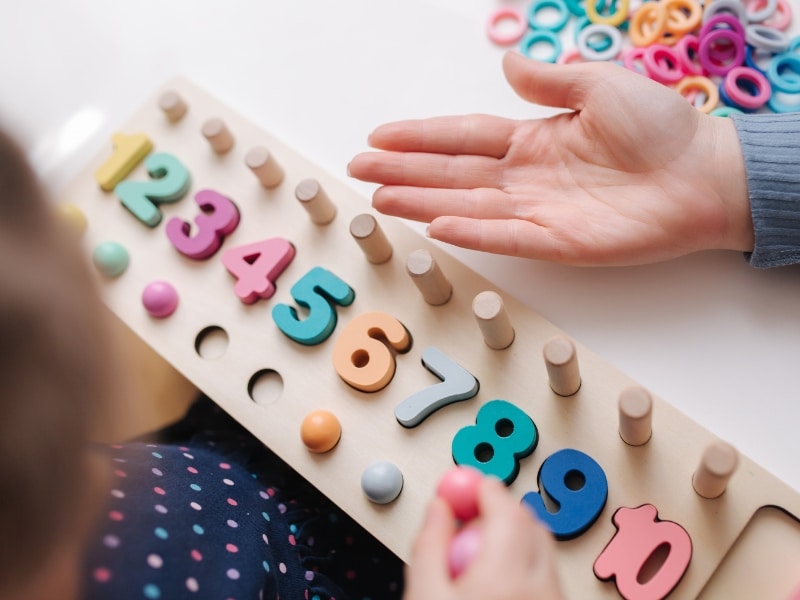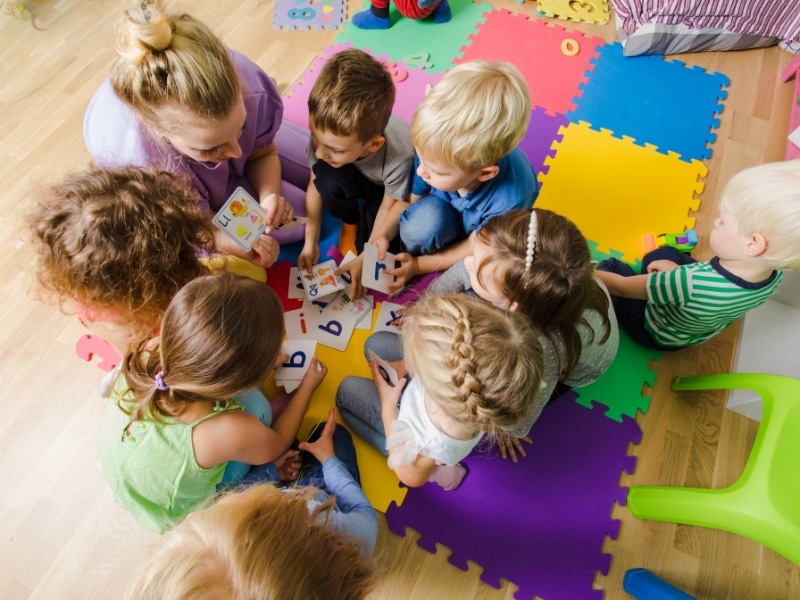Why Do Interactive Activities Improve Learning For Toddlers?

In early childhood education, interactive activities are vital in helping toddlers learn and grow. Unlike passive learning, which involves simply listening or watching, interactive learning engages toddlers physically, mentally, and emotionally. This hands-on approach fosters curiosity, boosts cognitive development, and strengthens social skills. By engaging in activities that involve movement, problem-solving, and communication, toddlers develop essential life skills while having fun. But why are interactive activities so practical? Explore how they enhance learning and why they are crucial for early childhood development.
What are interactive activities for toddlers?
Interactive activities for toddlers are hands-on experiences that encourage active participation, exploration, and engagement while also stimulating brain development, enhancing motor skills, and fostering social interaction.
Examples of interactive activities:
- Sensory play: Playing with sand, water, or textured materials to enhance touch and coordination.
- Music and movement: Dancing, clapping, and singing to improve rhythm and motor skills.
- Storytelling with actions: Acting out stories with hand gestures and expressions to develop language skills.
- Outdoor play: Running, climbing, and playing in nature to build physical strength and coordination.
- Pretend play: Dressing and role-playing different scenarios to boost creativity and problem-solving skills.
- Puzzles and sorting games: Matching colours, shapes, and objects to strengthen cognitive abilities.
- Building and stacking: Using blocks and toys enhances fine motor skills and spatial awareness.
Interactive activities make learning fun while improving essential developmental skills. They stimulate creativity, problem-solving, and communication in ways passive learning cannot.
Why do interactive activities enhance toddler learning?
Interactive activities engage multiple senses, reinforcing learning through experience. Toddlers absorb information more effectively when they can see, hear, and touch objects in their environment.
Benefit | How It Helps |
Stimulates Brain Development | Builds neural connections for long-term learning. |
Encourages Problem-Solving | Enhances critical thinking through exploration. |
Boosts Memory Retention | Improves recall by engaging children in activities. |
Supports Emotional Growth | Strengthens trust and emotional security with caregivers. |
Enhances Motor Skills | Develops coordination through movement-based play. |
Interactive learning naturally allows toddlers to develop cognitive and emotional skills, making education enjoyable and effective.
How does play-based learning improve social skills?
Social development is essential to early childhood education, and in addition, play-based learning plays a crucial role in helping toddlers develop communication and teamwork skills.
Ways play-based learning enhances social skills:
- Encourages sharing: Playing with others teaches turn-taking and cooperation.
- Develops emotional intelligence: Role-playing helps toddlers understand different emotions.
- Improves communication: Group activities enhance listening and speaking abilities.
- Builds teamwork skills: Games requiring collaboration teach toddlers how to work with others.

- Reduces shyness – Regular social interaction increases confidence in group settings.
- Teaches conflict resolution – Engaging in group play helps toddlers positively navigate disagreements.
Play-based learning fosters social skills by promoting teamwork, empathy, and communication, all essential for healthy interactions in later life.
What are the cognitive benefits of interactive activities?
Interactive learning promotes cognitive development, which helps toddlers process information, solve problems, and think critically.
Cognitive Benefits:
- Enhances problem-solving skills: Activities like puzzles encourage logical thinking.
- Strengthens memory: Repeating interactive tasks helps reinforce learning.
- Develops attention span: Engaging activities keep toddlers focused for more extended periods.
- Supports early numeracy and literacy: Counting, matching, and identifying letters build foundational knowledge.
- Boosts decision-making skills: Making choices during play helps toddlers develop independence.
Cognitive growth is accelerated when toddlers engage in interactive activities, laying a strong foundation for academic success and everyday decision-making.
How do interactive activities for toddlers boost confidence?
Toddlers’ self-confidence grows when they complete tasks and challenges. Interactive activities create opportunities for achievement and personal growth.
How Interactive play builds confidence:
- Encourages independence: Toddlers learn to complete tasks without constant assistance.
- Provides a sense of achievement: Finishing puzzles or games boosts self-esteem.
- Provide a safe space for trial and error – Making mistakes in a fun setting fosters resilience.
- Promotes positive reinforcement: Praise and encouragement motivate toddlers to keep trying.
- Improves decision-making: Making choices during play builds trust in their own judgment.
- Reduces fear of failure: Fun, low-pressure activities encourage trial and error.

By engaging in interactive activities, toddlers not only build self-confidence but also develop independence, and, as a result, learn to trust their abilities.
Can interactive activities improve speech and language development?
Language skills develop best when toddlers actively engage in conversation and interactive play.
How interactive activities support speech and language:
- Encourages verbal expression: Singing, storytelling, and conversations build vocabulary.
- Develops listening skills: Responding to instructions helps toddlers understand spoken language.
- Promotes sentence formation: Role-playing not only enhances sentence structure but also improves communication.
- Expand vocabulary: Naming objects, animals, and colours improves language development.
- Boosts pronunciation: Repeating words and sounds helps toddlers refine speech clarity.
Interactive activities allow toddlers to practise speaking and listening in a fun and engaging way, significantly accelerating language development.
Which interactive activities work best for different skills?
Different types of interactive activities target various developmental skills.
Skill Development | Position |
Motor Skills | Drawing, climbing, stacking blocks |
Cognitive Skills | Puzzles, counting games, storytelling |
Social Skills | Role-playing, group games, team-building tasks |
Speech Development | Singing, reading aloud, interactive conversations |
Emotional Growth | Sensory play, pretend play, art therapy |
Matching activities with developmental goals helps toddlers strengthen specific skills while keeping them engaged and entertained.
How can parents encourage interactive learning at home?
Parents play a crucial role in fostering interactive learning outside daycare or preschool.
Ways to encourage learning at home:
- Create a learning-friendly space – Set up a designated play area with educational toys.
- Use everyday moments – Turn grocery shopping or cooking into fun learning experiences.
- Encourage outdoor play – Fresh air and nature-based activities enhance curiosity and problem-solving.
- Engage in reading together – Reading stories builds vocabulary and comprehension skills.
- Limit screen time – Focus on hands-on activities that encourage creativity and thinking.
- Play together – Interactive parent-child games strengthen relationships and reinforce learning.
By incorporating interactive learning into daily routines, parents can not only enhance their child’s development but also make learning an enjoyable experience.
The power of playful learning
Interactive activities are the key to effective early childhood learning. By engaging in hands-on experiences, toddlers develop essential cognitive, social, and language skills. These activities encourage curiosity, creativity, and confidence, laying a strong foundation for future learning. Whether at home or in a structured early learning environment provided by a comprehensive childcare services provider, interactive activities help toddlers grow fun and meaningfully.
At Innocent Minds, we provide tailored early learning programs for toddlers that focus on building essential skills in a nurturing, play-based environment. Our experienced educators ensure every child receives personalised attention, fostering creativity, curiosity, and independence. With various educational activities—from language development to problem-solving and music programs—your toddler will thrive in a safe, supportive setting. Contact Innocent Minds today to learn how our programs can support your child’s growth and lay a strong foundation for future learning.
